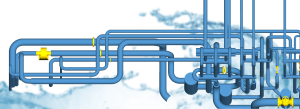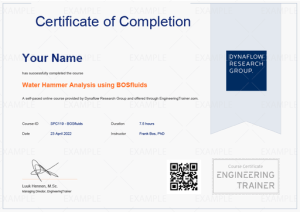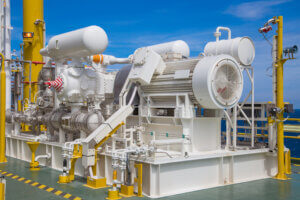
Water Hammer Analysis using BOSfluids
Training Courses Water Hammer Analysis using BOSfluids: Surge Analysis Download Brochure About The Course This course teaches you all the fundamentals of performing water hammer
Acoustic Induced Vibrations (AIV) and Flow Induced Vibrations (FIV) can cause piping systems to vibrate potentially resulting in fatigue failure. These excitation mechanisms are non-linear and strongly influenced by process conditions and pipework design such as mass flow rates and valve trims. Therefore, it can be difficult to predict the presence in new systems or the best remedial action in existing systems.
In this course, you will come to understand the physical concepts of both excitation mechanisms in detail and gain knowledge on strategies to overcome associated vibration issues in the field and reduce the risk when designing new systems. Next to relevant theory, high-risk systems, and codes & standards, a multitude of real-life cases are discussed including methods for troubleshooting AIV and FIV issues.
The course consists of 4 modules. All online training content is provided through your EngineeringTrainer account.
After the course, you maintain 1-year unlimited access to the course and the discussion forum. This allows you to perform modules again when you need to refresh the knowledge for your projects.
Introduction to AIV and FIV
Focal points and Agenda
Dynamic problems in pipe stress analysis
Failure examples due to dynamic loads
Types of vibrations: Non-periodic & periodic
Types of vibrations: Non-harmonic & harmonic
Pipe rupture due to Fatigue Failure
Excitation sources causing vibrations
Induced vibrations and pulsations
Flow and unbalanced forces in piping systems
Vibration theory and SDOF
Dynamic response and harmonic vibrations
Eigenmodes in piping systems
Relevant codes for dynamic analysis
A sample of the first module is available for free, so you can learn more about the teaching style and understand if the course fits your needs.
Module Introduction
Acoustically Induced Vibrations (AIV)
Coupling mechanism and Excitation
Coupling mechanism and Modes
Coupling mechanism and Peak Stresses
Codes and guidelines for AIV
AIV relations: Part 1
AIV relations: Part 2
Detailed analysis of AIV
Mitigation measures against AIV
Cavitation basics and Flashing
Cavitation advanced and Flashing
Slug flow basics
Slug flow: Advanced considerations
AIV & FIV example
Course evaluation survey
Your Personal Certificate
Rate this course
Related resources
Follow up
Self-Paced
This course is self-paced and is not subject to specific dates. The course contains 4 modules with a total of 4 hours of content which can be performed at your own pace. A personal certificate will be provided to you if you finish the course within the first month after purchase. This incentive aims to motivate you to perform the course on time, thereby improving your learning curve.
E-Hybrid
This course is scheduled regularly with a drip feed of modules becoming available to the participants throughout the program. The drip schedule aims to provide consistency to your learning experience and is designed to maintain participant concentration and provide adequate time to perform exercises between live instructor sessions where the instructor may answer any questions about the topic.
This course type is also available for a private schedule for teams of a minimum of 4 people.
Spring Program:
Fall Program:
This course is scheduled for 1 work day. The dates of the course are organized upon inquiry.
This course is available in self-paced, hybrid, and classroom formats.
Prerequisites and level
Intended For
This course is designed for:
Access to the self-paced course
After your purchase is confirmed you receive an account to the EngineeringTrainer online learning portal, where you can find the course in your dashboard. After opening the course you will be guided step-by-step through the different modules. You receive 1-year unlimited access to the course, allowing for the repetition of modules as desired.
Learn by doing
The self-paced and E-hybrid courses are mainly based on video content: video lectures and video software demonstrations. English subtitles are available and videos can be viewed as many times as desired. The video lectures help you to grasp the important technical concepts and in the video demonstrations the instructor uses the software and discusses all the steps and actions. You are recommended to follow the steps of the instructor in the software to optimize your learning curve.
The live sessions of the E-hybrid course are provided through MS Teams for which links are distributed from your course dashboard.
The classroom course is performed in person either on-site or in the Dynaflow Research Group office located in Rijswijk, The Netherlands. This course enables you to be face-to-face with the instructors with live examples provided. This course also provides all participants with a 1-year access to the self-paced course.
Participants of the self-paced and E-hybrid courses receive a personal digital certificate if they meet the following requirements:
Participants of the classroom course receive a personal physical certificate upon the completion of the course.
Example certificate:

After this course, participants are expected to:
Video lectures,
Instructor-led live sessions with lectures, group discussions and Q&A’s,
Discussion forum with other participants & instructor.
Videos will not be available for download, but can be accessed directly with your account on the portal. If slides are used in the videos or live sessions these can be viewed separately as well through the portal, but are not available for download.
You receive 1-year unlimited access to the course. This allows you to watch content again if this is beneficial for your work projects.
Yes, live sessions are included in this course that allow you to interact with the instructor and ask questions. Additionally, questions can be submitted in the learning portal by the participants which are addressed in the live sessions.
No software is required for participants of this course.
Self-paced Modules
If your computer and internet connection are able to play videos online and have MS Teams calls you will be able to follow the course. Note that almost all browsers are supported, except for Internet Explorer.
Live sessions
Live events are provided by means of Microsoft Teams. Hence it required to have an MS Teams account. Additionally, a webcam and microphone are mandatory for the live events. Separate earplugs are recommended as to avoid sound echo.
Yes, this course qualifies for PDH hours as per the NCEES CPC Guidelines.

Training Courses Water Hammer Analysis using BOSfluids: Surge Analysis Download Brochure About The Course This course teaches you all the fundamentals of performing water hammer

Training Courses Pulsations And Vibrations: Reciprocating Compressors Free Course Preview Download Brochure About The Course This course imparts fundamental knowledge of pressure pulsations in piping,

Training Courses How to Review a Pulsation Study Free Course Preview About The Course Pulsation studies can result in quite elaborate and complex reports with
Laan van Oversteen 20
6th floor
2289 CX Rijswijk
The Netherlands
© Dynaflow Research Group BV